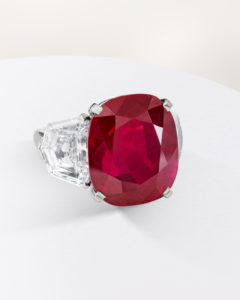Christie’s has canceled an upcoming jewelry sale after complaints of Nazi connections. At their Geneva location, Christie’s hosted a successful sale in May called the World of Heidi Horten, featuring the Austrian billionaire’s jewelry collection. Among the collection highlights were a three-stranded Harry Winston pearl necklace (Fr.6.46 million / $7.25 million w/p), a gold ring set with a 20-carat pear-shaped pink diamond (Fr.4.28 million / $4.8 million w/p), and a Cartier platinum ring set with an enormous red stone of more than 25 carats known as the Sunrise Ruby (Fr.13 million / $14.66 million w/p). The May auction brought in a total of Fr.138.3 million, or $155.4 million, setting the record for the most successful jewelry auction ever. Christie’s scheduled a second sale in November; however, this has been canceled because of the source of Horten’s wealth.
Heidi Horten was born Heidi Jelinek in Vienna three years after Austria’s annexation by the Nazis. In 1960, when she was 19, she met 51-year-old department store owner Helmut Horten at a hotel bar. Six years later, they married. Horten’s department store chain was the fourth-largest in Germany, making him one of the wealthiest entrepreneurs in the country. He had private jets, several yachts, and a villa in the western German city of Mülheim. In Duisburg, where he had started his business, he was a local philanthropist and founded his own organization to promote medical research. He was married to Heidi until he died in 1987. After inheriting his wealth, Heidi spent the rest of her life supporting charitable organizations, collecting art, hunting, and relaxing on her yacht, Carinthia VII. In 2020, Forbes estimated she was worth about $3 billion. After her death in June 2022, her estate consigned her jewelry collection to Christie’s.
Christie’s ended up canceling the November sale because of how the Hortens obtained their wealth. Helmut Horten first found success in business in the 1930s, in particular thanks to new laws enacted by the Nazis applying to Jewish-owned companies. I’ve touched upon this subject before, when in December 2022, the descendants of the Mendelssohn family demanded that museums return parts of their former art collection. The Mendelssohn family owned one of the most successful banks in Germany when the Nazis came to power. Through Aryanization, the German government passed new laws targeting Jewish-owned businesses to force their owners to sell. For example, Deutsche Bank bought and liquidated Mendelssohn & Co. in 1938. Helmut Horten was one of the businessmen who benefited from these policies, buying up formerly Jewish-owned businesses and building his department store empire. One of the first businesses he took over was the Kaufhaus Alsberg, a department store chain in western Germany owned by the Jewish Alsberg family. He had been an employee of the Alsbergs before the sale. Horten was a member of the Nazi party and had a very good relationship with the government.
Several Jewish organizations spoke out against the initial May sale, asking Christie’s to do their due diligence and perform more research on individual items. This is mainly to see if any pieces in the jewelry collection were previously owned by Jewish families forced to sell their valuables because of Aryanization laws. Christie’s went on with the first sale anyway, attempting to deflect criticism by saying that a portion of the auction proceeds would go to Holocaust education groups. It wasn’t until the New York Times published a report about the situation that Christie’s announced their cancellation of the November sale. Even with the sale canceled, some of the groups Christie’s promised to donate to announced that they would refuse such donations, most notably Yad Vashem, Israel’s state-run Holocaust memorial.

